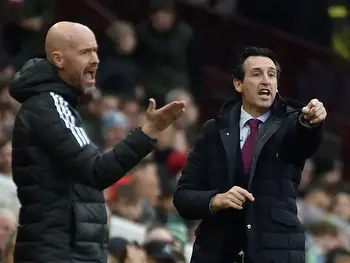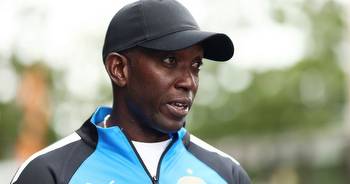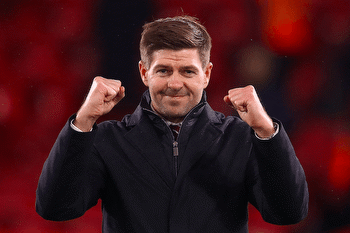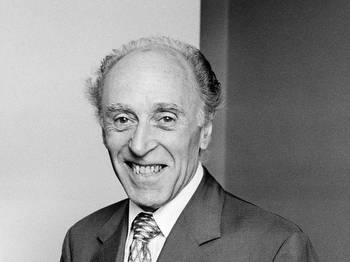The vision of Venglos: Aston Villa's first foreign foray

In a world where Aston Villa fans are getting excited once more about the club and future success thanks to the work being done by Unai Emery, we’ve decided to go back in time and remember not just the first foreign manager at Villa Park, but the first ever in English football – Dr Jozef Venglos.
A revolutionary arrival shakes up English football
When Dr. Jozef Venglos arrived at Aston Villa in 1990, English football was in for a transformative experience. As the first foreign manager in the top flight, he brought with him a fresh perspective and a vision that would challenge the traditional football norms of the time and set the stage for a new era of innovation.
Following the departure of England-bound manager Graham Taylor, Villa chairman ‘Deadly’ Doug Ellis sought a replacement to continue the club’s success. Amid the speculation of an all-English race to find Taylor’s successor, Ellis defied expectations by unveiling the enigmatic Dr. Jozef Venglos. The 54-year-old Czechoslovakian, with a doctorate in physical education and a passion for philosophy, was a relative unknown in British football. Nevertheless, Ellis saw in him the potential to revolutionize the game and lead Villa to new heights.
Venglos wasted no time in instilling his forward-thinking philosophy at Aston Villa. He emphasized the importance of nutrition and training, which proved to be groundbreaking. In an era where English football largely neglected dietary regimes and modern fitness techniques, Venglos sought to change the landscape and introduce a brave new world of healthier practices. His innovative ideas extended to the training ground, where proper warm-ups and warm-downs became the norm, setting him apart from traditional coaching approaches prevalent at the time.
As Venglos settled into his role, he faced challenges from players and the media who were skeptical of his unconventional methods. However, he remained steadfast in his beliefs, committed to modernizing the game and introducing a new style of play. While his tenure at Villa may not have yielded immediate success, his pioneering spirit laid the foundation for future changes in the sport. Dr. Jozef Venglos’ legacy as a visionary who dared to challenge footballing traditions continues to inspire a new era of football in England.
A brave new world of nutrition and training
When Dr. Jozef Venglos stepped into the scene at Aston Villa in 1990, English football was on the cusp of a revolutionary transformation. As the first foreign manager in the top flight, Venglos arrived with a fresh perspective and a visionary approach that would challenge the traditional football norms of the time and set the stage for a new era of innovation.
Following the departure of England-bound manager Graham Taylor, Villa chairman ‘Deadly’ Doug Ellis embarked on a quest to find a replacement to continue the club’s success. Among the speculation of an all-English race to find Taylor’s successor, Ellis defied expectations by unveiling the enigmatic Dr. Jozef Venglos. Despite being a relative unknown in British football, the 54-year-old Czechoslovakian with a doctorate in physical education and a passion for philosophy caught Ellis’ attention, as he saw in him the potential to revolutionize the game and lead Villa to new heights.
Venglos wasted no time in instilling his forward-thinking philosophy at Aston Villa. He emphasized the importance of nutrition and training, which proved to be groundbreaking. In an era where English football largely neglected dietary regimes and modern fitness techniques, Venglos sought to change the landscape and introduce a brave new world of healthier practices. His innovative ideas extended to the training ground, where proper warm-ups and warm-downs became the norm, setting him apart from traditional coaching approaches prevalent at the time.
As Venglos settled into his role, he faced challenges from players and the media who were skeptical of his unconventional methods. However, he remained steadfast in his beliefs, committed to modernizing the game and introducing a new style of play. While his tenure at Villa may not have yielded immediate success, his pioneering spirit laid the foundation for future changes in the sport. Dr. Jozef Venglos’ legacy as a visionary who dared to challenge footballing traditions continues to inspire a new era of football in England.
In a 2021 interview with FourFourTwo, people around Venglos reflected on the changes he immediately instigated.
“It has been like having bread with no butter without the English clubs in Europe,” he said. The dairy product was soon on his hit list at the club’s Bodymoor Heath Training Ground, though. “In terms of nutrition, he was ahead of his time, particularly in English football,” remembered Tony Daley, the former Villa and England winger who played under Venglos in 1990-91. “I remember eating steak and chips the night before the game when I first started playing. That went out of the window overnight.”
The similarly well-traveled Venglos thought along the same lines, but while Wenger was hailed as a forward-thinker, the Czechoslovakian, six years earlier, was derided as a crank – often by members of his own team. Dietary regimes hadn’t previously been a staple of the English game, a fact probably best summed up by Tony Adams in an interview in Jasper Rees’ biography of Wenger back in 2003. “We were always concerned about our diet,” said Adams, after revealing he had been burying his nose in a book entitled Eat to Win as far back as 1987. “It just so happened that I would be going out on a Saturday night and putting 30 pints of lager down my neck over the weekend.”
However, when the Frenchman arrived at Highbury in 1996, he brought with him a wealth of dietary knowledge acquired in Japan, where boiled chicken, steamed fish, and raw vegetables were very much the order of the day. The similarly well-traveled Venglos thought along the same lines, but while Wenger was hailed as a forward-thinker, the Czechoslovakian, six years earlier, was derided as a crank – often by members of his own team.
“I remember eating steak and chips the night before the game when I first started playing. That went out of the window overnight.”
“In all sports, players like to have things the same way,” recalled former Villa striker Peter Withe, who joined Venglos as his assistant midway through the manager’s sole season at the club. “What Graham [Taylor] did was the British way and the players were comfortable with that. So when this new philosophy was introduced around training, diet, and drinking, some players resented it. They shut it out.”
Daley agrees, telling FourFourTwo back in 2021 that some of the club’s older players struggled to adapt to being told what they could and couldn’t shove down their throats. “I’m not saying there was a drinking culture, but the boys would go out for a midweek drink pretty regularly,” he says. “Other players at other clubs did exactly the same. The guys who had played 400 matches saw little reason why they should suddenly change their habits.”
Venglos’ focus on nutrition and training was progressive and visionary, but it was met with resistance and scepticism in the English football culture of the time. While he was ahead of his time, the players’ reluctance to embrace his ideas contributed to challenges in implementing his vision at Aston Villa. Nevertheless, Venglos’ dedication to modernizing the game’s approach to nutrition and training laid the groundwork for future changes in the sport.
Venglos vs. English football culture: A clash of ideals
As Jozef Venglos settled into his role as Aston Villa’s manager, it became evident that he was not just a foreign outsider in the English football landscape; he was a man with a distinct vision that clashed with the traditional football culture of the time. English football had long prided itself on its physicality, direct style of play, and an emphasis on familiar, British methods. Venglos, on the other hand, was a philosopher and an innovator who sought to challenge these deeply ingrained beliefs.
At the heart of the clash was Venglos’ approach to training and tactics. He placed a strong emphasis on modern fitness techniques, warm-ups, and warm-downs, which were considered alien to the English players. For many Villa players, the idea of meticulous preparation and scientific training methods seemed at odds with the rugged and robust English football culture they were accustomed to.
Moreover, Venglos’ dietary recommendations were met with resistance from some of the club’s senior players. In a football culture where a pre-match meal of steak and chips was commonplace, Venglos’ introduction of healthier eating habits was met with scepticism and even derision. His attempts to steer the players away from indulging in alcohol also caused friction, as the traditional post-match visit to the pub was deeply ingrained in the English footballing lifestyle.
Venglos’ philosophical approach to the game also led to a clash of playing styles. He emphasized a passing and possession-based game, in contrast to the more direct and aggressive style preferred by English teams. While his ideas were visionary and forward-thinking, they faced resistance from players who were accustomed to a different approach and found it challenging to adapt to the new philosophy.
The media’s criticism and raised eyebrows also added to the pressure on Venglos. English football, with its insular mindset, was not prepared to accept a foreign manager with unconventional ideas. The press questioned his methods and made it difficult for him to gain widespread support and understanding.
Despite the challenges, Venglos remained true to his beliefs and convictions. He believed in the power of his ideas and sought to modernize English football, even in the face of resistance. While his tenure at Aston Villa did not yield the desired results on the pitch, his legacy as a visionary who challenged footballing traditions and paved the way for future foreign managers in English football remains intact. Venglos’ clash with English football culture was not just a test of his managerial skills but also a clash of ideals that ultimately contributed to the transformation of the English game in the years to come.
Villa’s European triumph amid domestic struggles
Amidst the struggles in the domestic league, Jozef Venglos managed to lead Aston Villa to a memorable victory in the UEFA Cup, providing a moment of triumph amidst the challenges faced by the club. Villa’s European campaign proved to be a highlight in an otherwise difficult season under the management of the foreign pioneer.
Facing formidable opponents in the UEFA Cup, Villa’s clash with Inter Milan in the second round showcased the potential of Venglos’ innovative ideas. The Italian giants boasted World Cup winners and European stars in their lineup, making them a formidable force to reckon with. However, Villa displayed resilience and adaptability under Venglos’ guidance, securing a resounding 2-0 win at Villa Park in the first leg.
The victory was a testament to the impact of Venglos’ tactical approach and his emphasis on possession-based football. Villa’s performance demonstrated that, despite the challenges they faced domestically, they were capable of taking on and triumphing over Europe’s elite teams.
While the second leg saw Villa fall short with a 3-0 defeat at the San Siro, the team’s European journey remained a point of pride for the club and its fans. The win over Inter Milan showcased the potential of Venglos’ innovative ideas and the impact they could have on the European stage, even amidst the domestic struggles.
Venglos’ tenure at Aston Villa may have ended on a disappointing note, but the European triumph served as a reminder of the pioneering vision he brought to the club. It was a fleeting moment of triumph amidst the challenges faced by Villa in adapting to a new managerial approach and a testament to the impact of Venglos’ forward-thinking ideas on the European stage. Despite the struggles faced domestically, the European success provided a glimpse of the potential that lay ahead for both the manager and the club, setting the stage for further exploration of innovative footballing concepts in the years to come.
He left Aston Villa after just one season – the club one place above the relegation zone.
Venglos at Villa in his own words
Whenever asked to reflect on his time as the manager of Aston Villa, Dr. Jozef Venglos expressed a mix of appreciation and acknowledgment of the challenges he faced during his tenure. In his own words, Venglos shed light on his experiences and the impact of his innovative ideas on English football.
When asked about his appointment as Villa’s manager, Venglos recalled the surprise and appreciation of what he had achieved in his coaching career. He mentioned the warm welcome he received from the club and the fans, with Villa chairman Doug Ellis boldly proclaiming him as “the top man in Europe.”
In discussing his revolutionary approach to nutrition and training, Venglos emphasized the importance of proper warm-ups and warm-downs, which he believed were crucial for the players’ fitness and performance. He was determined to introduce modern fitness techniques and healthier dietary habits, which were met with resistance from some of the traditional English players.
Venglos also touched on the challenges he faced in implementing his tactics and playing style at Villa. He emphasized his belief in a passing and possession-based game, which clashed with the more direct and aggressive style preferred by English teams at the time. Despite facing scepticism and criticism from both players and the media, Venglos remained steadfast in his philosophy and continued to advocate for a modernized approach to football.
Reflecting on Villa’s European triumph against Inter Milan in the UEFA Cup, Venglos expressed pride in the team’s performance and showcased the potential of his innovative ideas on the European stage. Despite the domestic struggles, the victory served as a moment of triumph and validation for Venglos’ managerial approach.
In looking back on his time at Aston Villa, Venglos acknowledged the difficulties he encountered but also recognized the mutual respect between himself and the players. Despite not achieving the desired results in the league, he remained grateful for the opportunity to manage such a historic club and was pleased to witness the progress of English football.
In his own words, Venglos showcased his dedication to modernizing the game and his vision for the future of football. His time at Villa may have been short-lived, but his pioneering spirit and legacy as the first foreign manager in the English top flight left an enduring impact on the sport, setting the stage for the influx of foreign managers that would follow in the years to come.
Venglos at Villa: What they said
Jozef Venglos’ time as the manager of Aston Villa left a lasting impression on those who witnessed his unique approach to football. Former players, staff, and media members have shared their stories and insights into what it was like at Villa when Venglos was in charge.
Tony Daley, former Villa and England winger who played under Venglos in 1990-91, recalls the drastic changes in the training and dietary routines. He said, “I remember eating steak and chips the night before the game when I first started playing. That went out of the window overnight.” Daley highlights Venglos’ emphasis on proper nutrition and fitness as a significant departure from the traditional British football culture.
Peter Withe, former Villa striker and Venglos’ assistant midway through his tenure, remembers the media’s scepticism and the clash of ideals within the squad. He says, “I think some of the press and the other managers found it hard to come to terms with him…A couple of managers who were sat with us thought it was hilarious and started laughing.”
Ralph Ellis, the Daily Star’s man in the Midlands in 1990, reflects on the intrigue surrounding Venglos’ appointment as the first foreign manager in the top flight. He recalls the media’s initial lack of knowledge about the new manager, stating, “We were there for the new manager’s arrival but had no idea who it was. Doug’s memorable introduction was: ‘Does anybody know who this is?’ There was widespread silence.”
So, in summary
Dr. Jozef Venglos’ time as the manager of Aston Villa marked a pivotal moment in English football history. As the first foreign manager in the top flight, Venglos introduced innovative ideas that challenged the traditional football culture of the time. His emphasis on nutrition, modern fitness techniques, and possession-based play clashed with the rugged English style. Despite facing resistance and scepticism, Venglos remained true to his vision, leaving a lasting impact on the sport. While his tenure at Villa may not have yielded immediate success, his pioneering spirit paved the way for future foreign managers in the English top flight. Venglos’ legacy as a visionary who dared to challenge footballing traditions continues to resonate, inspiring a new era of football in England.



































